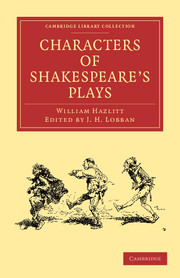Book contents
- Frontmatter
- Preface
- Contents
- Introduction
- Preface
- Cymbeline
- Macbeth
- Julius Cæsar
- Othello
- Timon of Athens
- Coriolanus
- Troilus and Cressida
- Antony and Cleopatra
- Hamlet
- The Tempest
- The Midsummer Night's Dream
- Romeo and Juliet
- Lear
- Richard II
- Henry IV
- Henry V
- Henry VI
- Richard III
- Henry VIII
- King John
- Twelfth Night; or, what you will
- The Two Gentlemen of Verona
- The Merchant of Venice
- The Winter's Tale
- All's Well That Ends Well
- Love's Labour's Lost
- Much Ado About Nothing
- As You Like It
- The Taming of the Shrew
- Measure for Measure
- The Merry Wives of Windsor
- The Comedy of Errors
- Doubtful plays of Shakespear
- Poems and Sonnets
- Notes
King John
Published online by Cambridge University Press: 07 September 2010
- Frontmatter
- Preface
- Contents
- Introduction
- Preface
- Cymbeline
- Macbeth
- Julius Cæsar
- Othello
- Timon of Athens
- Coriolanus
- Troilus and Cressida
- Antony and Cleopatra
- Hamlet
- The Tempest
- The Midsummer Night's Dream
- Romeo and Juliet
- Lear
- Richard II
- Henry IV
- Henry V
- Henry VI
- Richard III
- Henry VIII
- King John
- Twelfth Night; or, what you will
- The Two Gentlemen of Verona
- The Merchant of Venice
- The Winter's Tale
- All's Well That Ends Well
- Love's Labour's Lost
- Much Ado About Nothing
- As You Like It
- The Taming of the Shrew
- Measure for Measure
- The Merry Wives of Windsor
- The Comedy of Errors
- Doubtful plays of Shakespear
- Poems and Sonnets
- Notes
Summary
Kingjohn is the last of the historical plays we shall have to speak of; and we are not sorry that it is. If we are to indulge our imaginations, we had rather do it upon an imaginary theme; if we are to find subjects for the exercise of our pity and terror, we prefer seeking them in fictitious danger and fictitious distress. It gives a soreness to our feelings of indignation or sympathy, when we know that in tracing the progress of sufferings and crimes, we are treading upon real ground, and recollect that the poet's dream “denoted a foregone conclusion” —irrevocable ills, not conjured up by fancy, but placed beyond the reach of poetical justice. That the treachery of King John, the death of Arthur, the grief of Constance, had a real truth in history, sharpens the sense of pain, while it hangs a leaden weight on the heart and the imagination. Something whispers us that we have no right to make a mock of calamities like these, or to turn the truth of things into the puppet and plaything of our fancies. “To consider thus” may be “to consider too curiously;” but still we think that the actual truth of the particular events, in proportion as we are conscious of it, is a drawback on the pleasure as well as the dignity of tragedy.
- Type
- Chapter
- Information
- Characters of Shakespeare's Plays , pp. 183 - 191Publisher: Cambridge University PressPrint publication year: 2009First published in: 1908

